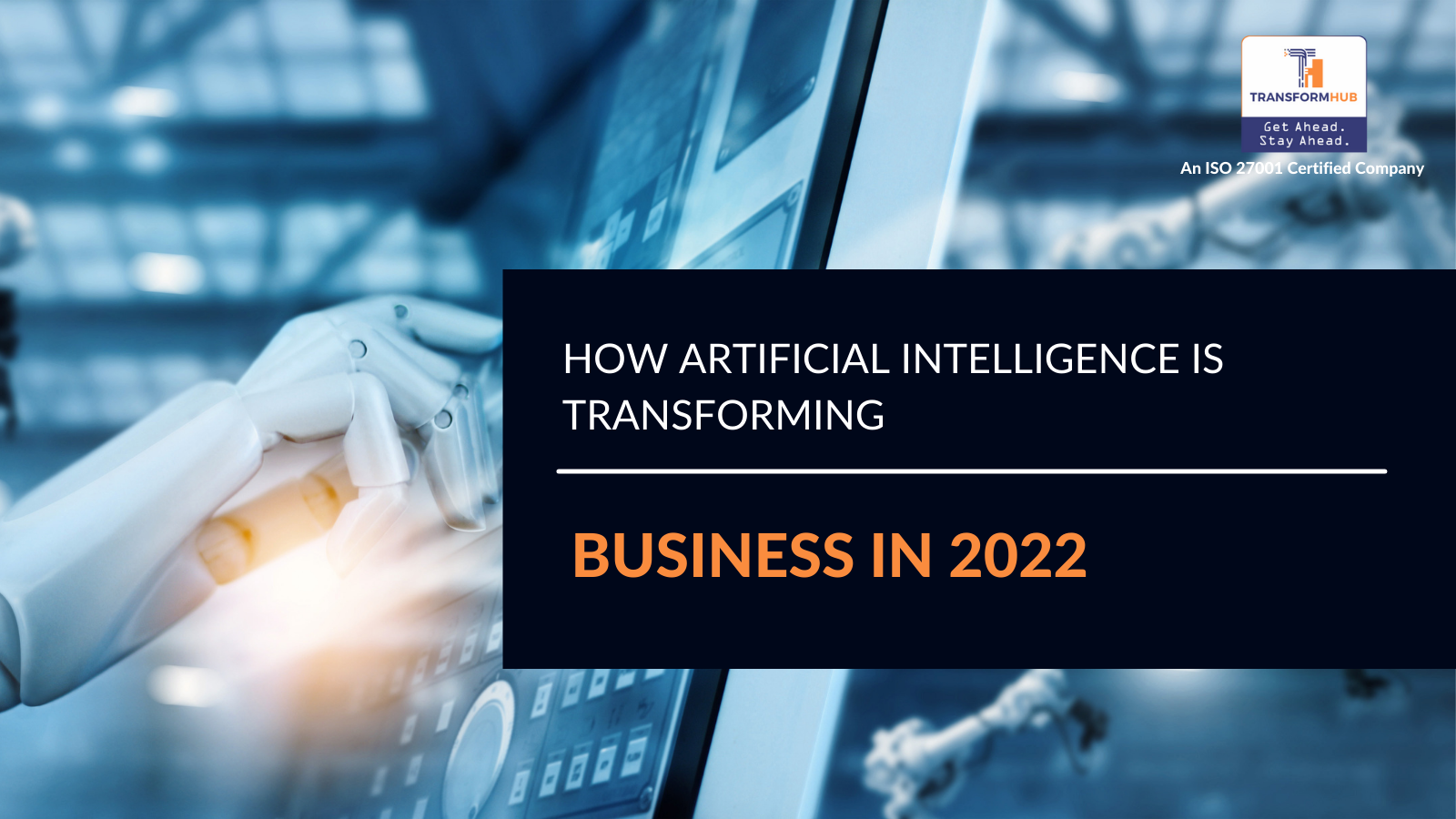Where Business Intelligence Meets Artificial Intelligence
Business Intelligence (BI) and Artificial Intelligence (AI) are both critical fields in the domain of data-driven decision making, but they focus on different aspects of the data utilization process.
These technologies are at the forefront of the best digital transformation services, enabling businesses to revolutionize their operations, customer experiences, and innovation strategies.
The following is a brief overview of what the terms stand for individually.
Business Intelligence refers to the technologies, applications, and practices for the collection, integration, analysis, and presentation of business information.
It helps in making informed decisions based on past and current data. It's about looking at historical trends, understanding the current state, and making decisions based on that information.
The basic purpose of business intelligence is therefore to support better decision making.
Listed below are a few of BI’s components:
- Data warehousing: Storing data from various sources in a central repository.
- Data mining: Extracting patterns from large datasets.
- Analytical processing: Transforming raw data into meaningful information.
- Reporting: Presenting data in an understandable format, such as charts and dashboards.
Artificial Intelligence is a broad area of computer science focused on creating smart machines capable of performing tasks that typically require human intelligence.
These tasks include learning (from data/experiences), reasoning (solving problems), and self-correction.
AI is about predicting the future and automating tasks. It can analyze vast amounts of data quickly and provide insights that were previously unattainable or took too long to ascertain.
Listed below are a few of AI’s components:
- Machine learning (ML): Algorithms that allow software applications to become more accurate in predicting outcomes without being explicitly programmed.
- Neural networks: Algorithms designed to recognize patterns and mimic the human brain.
- Natural language processing (NLP): The ability of a computer program to understand human language.
- Robotics: Design, construction, and operation of robots.
Read Also: Using AI To Your Advantage in Banking & Finance
The Power of BI + AI
When combined, BI and AI can be extremely powerful.
Imagine a system where BI provides insights about past business activities, and AI uses that information to predict future trends and even automate decisions based on those predictions.
For instance, a BI system might show that sales of a product have been declining over the past year, while an AI system could predict the future sales trajectory and automatically adjust marketing spend or alert managers to the trend.
Evolution of BI with the Advent of AI
The advent of AI has significantly influenced the evolution of BI. This intersection has led to many transformative changes in how businesses approach data, decision-making, and forecasting.
Let's look at the timeline and progression of how BI evolved with the incorporation of AI:
- Pre-AI BI Era:
- Manual analysis: Data analysis was more manual and required significant human intervention. It depended heavily on predefined static reports and fixed dashboards.
- Reactive insights: BI was largely retrospective, focusing on past events. It helped us understand what happened but not necessarily why it happened or what could happen in the future.
- Limited scalability: Handling big data was challenging, often requiring businesses to down-sample data or make other compromises.
- Early Stages of AI Integration:
- Predictive analytics: With the early integration of AI, BI tools started offering predictive analytics, enabling businesses to make forecasts based on historical data.
- Data processing scalability: AI allowed processing of vast amounts of data faster, facilitating better and more comprehensive insights.
- Natural Language Processing (NLP): Early adoption of NLP enabled users to query BI systems using natural language, making data analytics more accessible.
- Deepening AI Integration:
- Automated data prep and discovery: AI started automating the often-tedious data preparation processes. This included tasks like identifying outliers, cleaning data, and even suggesting relevant datasets for specific queries.
- Advanced predictive and prescriptive analytics: Beyond just forecasting, AI-enabled BI tools began suggesting specific actions to achieve desired outcomes.
- Personalized dashboards: AI-driven BI systems began customizing dashboards for individual users, showcasing the most relevant KPIs and insights based on their roles and past interactions.
- Mature AI-Infused BI Era:
- Real-time insights and actions: Modern BI systems, powered by AI, can provide real-time insights and even automate actions. For instance, a system might automatically adjust a digital advertising budget based on real-time sales data.
- Advanced anomaly detection: AI can instantly detect and alert businesses about anomalies in data, helping in fraud detection, quality assurance, and more.
- Cognitive search & data exploration: Modern BI tools, powered by AI, allow users to explore data contextually. For example, instead of a simple query like "Show monthly sales," one could ask, "Why was there a sales dip last July?"
- Conversational analytics: Chatbot integrations in BI tools enable users to have a conversational experience with data, asking questions, and receiving answers in natural language.
- The Future: AI-driven BI:
- Self-learning systems: BI systems will learn from user behaviors and preferences, continuously refining and optimizing the insights they provide.
- Fully automated decision-making: For certain scenarios, BI systems might not just provide insights but also take predefined actions without human intervention.
- Integrated augmented reality (AR) and virtual reality (VR): Future BI tools might integrate AR/VR for immersive data visualization experiences.
Essential AI Skills for Modern BI Professionals
Business intelligence professionals are traditionally skilled in data analysis, reporting, and visualization.
With the integration of Artificial intelligence into BI tools, there's a growing demand for BI professionals to acquire AI-related skills.
Here's a list of essential AI skills that modern BI professionals might consider developing:
- Understanding of machine learning
- Fundamentals: Grasp the basic principles of machine learning, including supervised and unsupervised learning, algorithms, and model evaluation.
- Model training & tuning: Understand how to train machine learning models and tune them for better performance.
Read Also: How AI and ML Are Changing the Lending Ecosystem
- Deep learning basics
- Neural Networks: A foundational understanding of neural networks, backpropagation, and activation functions.
- Frameworks: Familiarity with popular deep learning frameworks like TensorFlow, PyTorch, or Keras.
- Natural language processing (NLP)
Learn about tokenization, sentiment analysis, named entity recognition, and other key NLP concepts, given the rise of conversational analytics in BI.
- Programming & scripting
- Python & R: These are the primary languages for AI and data science tasks. Proficiency in libraries like Pandas, NumPy, and Scikit-learn is beneficial.
- SQL: While not exclusive to AI, advanced SQL skills are vital for data extraction and manipulation.
- Data preparation & ETL
AI models are only as good as the data fed to them. Skills in data cleaning, transformation, and integration are crucial.
- Statistical analysis
Deepen your understanding of statistics as they form the backbone of many AI algorithms. Topics like probability distributions, hypothesis testing, and regression analysis are essential.
- Big data technologies
Familiarity with platforms like Hadoop and Spark, given that AI often involves processing vast datasets.
- Cloud platforms
Experience with cloud platforms like AWS, Azure, or Google Cloud, especially their AI and ML services, can be beneficial given the increasing migration of BI tools to the cloud.
- Model deployment & management
Learn about deploying AI models into production environments, monitoring their performance, and updating them as necessary.
- Ethics in AI
Understand the ethical considerations, biases in AI, and the principles of responsible and transparent AI.
- Continuous learning
AI is a rapidly evolving field. A commitment to continuous learning, whether through courses, workshops, or self-study, is essential.
- Collaboration and communication skills
As AI integrates with BI, professionals will need to collaborate with diverse teams, including data scientists, engineers, and business stakeholders. Being able to convey complex AI concepts in understandable terms to non-technical stakeholders is crucial.
To Summarize
Incorporating these skills doesn't mean that a BI professional has to become a full-fledged data scientist. Regardless, a foundational understanding of AI principles and tools will greatly enhance their capabilities and adaptability in the modern BI landscape.
AI is poised to make BI tools more adaptive, intuitive, and predictive. As businesses grapple with ever-increasing data volumes and the need for real-time insights, the fusion of AI and BI will be crucial in driving efficiency, innovation, and competitive advantage.
In conclusion, the infusion of AI into BI has transitioned BI systems from being just retrospective reporting tools to forward-looking, proactive, and even prescriptive decision-making entities. This convergence promises to further revolutionize how businesses perceive and interact with data.
Let’s Connect
TransformHub, counted amongst the top digital transformation services companies, is at the forefront of delivering cutting-edge technologies, precisely tailored to your business requirements.
Share this
You May Also Like
These Related Stories

How Artificial Intelligence is Transforming Business in 2022

Leveraging generative artificial intelligence in banks




